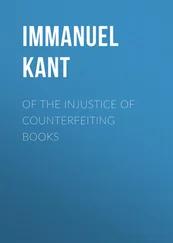Our Critique would be an investigation utterly superfluous, if there existed a possibility of proving a priori , that all thinking beings are in themselves simple substances, as such, therefore, possess the inseparable attribute of personality, and are conscious of their existence apart from and unconnected with matter. For we should thus have taken a step beyond the world of sense, and have penetrated into the sphere of noumena; and in this case the right could not be denied us of extending our knowledge in this sphere, of establishing ourselves, and, under a favouring star, appropriating to ourselves possessions in it. For the proposition: “Every thinking being, as such, is simple substance,” is an a priori synthetical proposition; because in the first place it goes beyond the conception which is the subject of it, and adds to the mere notion of a thinking being the mode of its existence, and in the second place annexes a predicate (that of simplicity) to the latter conception — a predicate which it could not have discovered in the sphere of experience. It would follow that a priori synthetical propositions are possible and legitimate, not only, as we have maintained, in relation to objects of possible experience, and as principles of the possibility of this experience itself, but are applicable to things in themselves — an inference which makes an end of the whole of this Critique, and obliges us to fall back on the old mode of metaphysical procedure. But indeed the danger is not so great, if we look a little closer into the question.
There lurks in the procedure of rational Psychology a paralogism, which is represented in the following syllogism:
That which cannot be cogitated otherwise than as subject, does not exist otherwise than as subject, and is therefore substance.
A thinking being, considered merely as such, cannot be cogitated otherwise than as subject.
Therefore it exists also as such, that is, as substance.
In the major we speak of a being that can be cogitated generally and in every relation, consequently as it may be given in intuition. But in the minor we speak of the same being only in so far as it regards itself as subject, relatively to thought and the unity of consciousness, but not in relation to intuition, by which it is presented as an object to thought. Thus the conclusion is here arrived at by a Sophisma figurae dictionis. 44
That this famous argument is a mere paralogism, will be plain to any one who will consider the general remark which precedes our exposition of the principles of the pure understanding, and the section on noumena. For it was there proved that the conception of a thing, which can exist per se — only as a subject and never as a predicate, possesses no objective reality; that is to say, we can never know whether there exists any object to correspond to the conception; consequently, the conception is nothing more than a conception, and from it we derive no proper knowledge. If this conception is to indicate by the term substance, an object that can be given, if it is to become a cognition, we must have at the foundation of the cognition a permanent intuition, as the indispensable condition of its objective reality. For through intuition alone can an object be given. But in internal intuition there is nothing permanent, for the Ego is but the consciousness of my thought. If then, we appeal merely to thought, we cannot discover the necessary condition of the application of the conception of substance — that is, of a subject existing per se — to the subject as a thinking being. And thus the conception of the simple nature of substance, which is connected with the objective reality of this conception, is shown to be also invalid, and to be, in fact, nothing more than the logical qualitative unity of self-consciousness in thought; whilst we remain perfectly ignorant whether the subject is composite or not.
Refutation of the Argument of Mendelssohn for the Substantiality or Permanence of the Soul.
This acute philosopher easily perceived the insufficiency of the common argument which attempts to prove that the soul — it being granted that it is a simple being — cannot perish by dissolution or decomposition; he saw it is not impossible for it to cease to be by extinction, or disappearance. He endeavoured to prove in his Phaedo, that the soul cannot be annihilated, by showing that a simple being cannot cease to exist. Inasmuch as, be said, a simple existence cannot diminish, nor gradually lose portions of its being, and thus be by degrees reduced to nothing (for it possesses no parts, and therefore no multiplicity), between the moment in which it is, and the moment in which it is not, no time can be discovered — which is impossible. But this philosopher did not consider that, granting the soul to possess this simple nature, which contains no parts external to each other and consequently no extensive quantity, we cannot refuse to it any less than to any other being, intensive quantity, that is, a degree of reality in regard to all its faculties, nay, to all that constitutes its existence. But this degree of reality can become less and less through an infinite series of smaller degrees. It follows, therefore, that this supposed substance — this thing, the permanence of which is not assured in any other way, may, if not by decomposition, by gradual loss (remissio) of its powers (consequently by elanguescence, if I may employ this expression), be changed into nothing. For consciousness itself has always a degree, which may be lessened. 45 Consequently the faculty of being conscious may be diminished; and so with all other faculties. The permanence of the soul, therefore, as an object of the internal sense, remains undemonstrated, nay, even indemonstrable. Its permanence in life is evident, per se, inasmuch as the thinking being (as man) is to itself, at the same time, an object of the external senses. But this does not authorize the rational psychologist to affirm, from mere conceptions, its permanence beyond life. 46
If, now, we take the above propositions — as they must be accepted as valid for all thinking beings in the system of rational psychology — in synthetical connection, and proceed, from the category of relation, with the proposition: “All thinking beings are, as such, substances,” backwards through the series, till the circle is completed; we come at last to their existence, of which, in this system of rational psychology, substances are held to be conscious, independently of external things; nay, it is asserted that, in relation to the permanence which is a necessary characteristic of substance, they can of themselves determine external things. It follows that idealism — at least problematical idealism, is perfectly unavoidable in this rationalistic system. And, if the existence of outward things is not held to be requisite to the determination of the existence of a substance in time, the existence of these outward things at all, is a gratuitous assumption which remains without the possibility of a proof.
But if we proceed analytically — the “I think” as a proposition containing in itself an existence as given, consequently modality being the principle — and dissect this proposition, in order to ascertain its content, and discover whether and how this Ego determines its existence in time and space without the aid of anything external; the propositions of rationalistic psychology would not begin with the conception of a thinking being, but with a reality, and the properties of a thinking being in general would be deduced from the mode in which this reality is cogitated, after everything empirical had been abstracted; as is shown in the following table:
| 1 I think, |
| 2 as Subject, |
3 as simple Subject, |
| 4 as identical Subject, in every state of my thought. |
Now, inasmuch as it is not determined in this second proposition, whether I can exist and be cogitated only as subject, and not also as a predicate of another being, the conception of a subject is here taken in a merely logical sense; and it remains undetermined, whether substance is to be cogitated under the conception or not. But in the third proposition, the absolute unity of apperception — the simple Ego in the representation to which all connection and separation, which constitute thought, relate, is of itself important; even although it presents us with no information about the constitution or subsistence of the subject. Apperception is something real, and the simplicity of its nature is given in the very fact of its possibility. Now in space there is nothing real that is at the same time simple; for points, which are the only simple things in space, are merely limits, but not constituent parts of space. From this follows the impossibility of a definition on the basis of materialism of the constitution of my Ego as a merely thinking subject. But, because my existence is considered in the first proposition as given, for it does not mean, “Every thinking being exists” (for this would be predicating of them absolute necessity), but only, “I exist thinking”; the proposition is quite empirical, and contains the determinability of my existence merely in relation to my representations in time. But as I require for this purpose something that is permanent, such as is not given in internal intuition; the mode of my existence, whether as substance or as accident, cannot be determined by means of this simple self-consciousness. Thus, if materialism is inadequate to explain the mode in which I exist, spiritualism is likewise as insufficient; and the conclusion is that we are utterly unable to attain to any knowledge of the constitution of the soul, in so far as relates to the possibility of its existence apart from external objects.
Читать дальше












